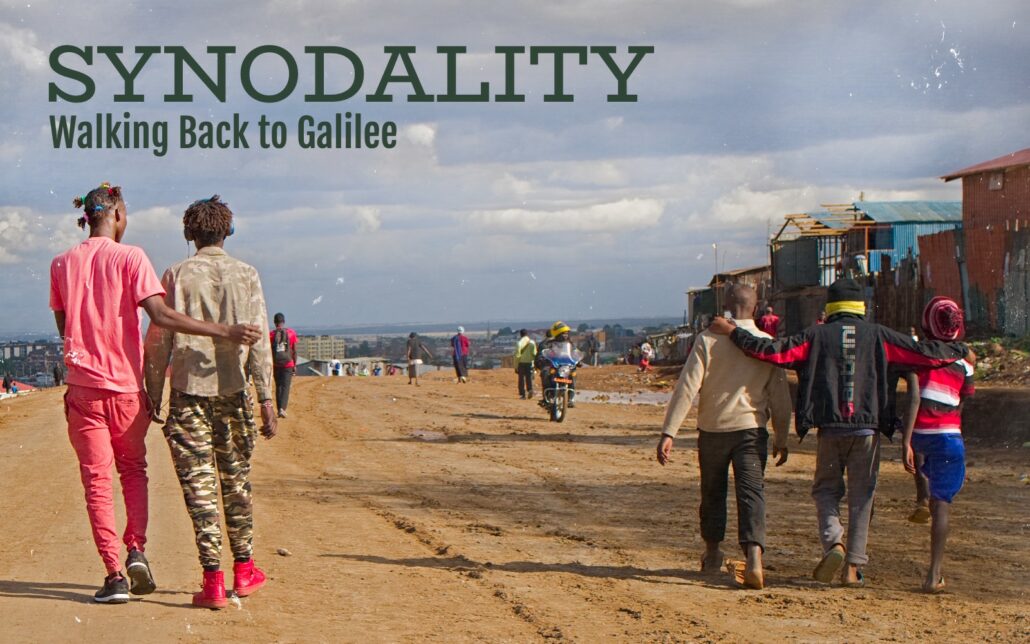See. Do. Be. Free.

Issue 008
An Open Letter to the Community around this year's theme.
Greetings,
Our theme this year is synodality. It means “walking together.” We are learning how to become a synodal community who walks together across difference.
This month we join the disciples on their return trip to Galilee.
After the resurrection, an angelic guide tells the disciples that Jesus “is going ahead of them to Galilee” (Mark 16:8). It’s a curious detail. Why are the disciples being invited to walk back to Galilee?
Galilee is where Jesus first called the disciples. That’s where the adventure began. For three years the disciples followed Jesus and underwent a particular kind of catechism. But let’s face it, the catechism made no sense to them. They were dazed and confused. And can we blame them? They hadn’t been given easter eyes through which to interpret their experience.
And so, the disciples are invited to retrace their steps. As if to say, “Let’s try this again. Let’s go back to the beginning and re-narrate the last three years, but this time with easter eyes. Eyes that have seen the mercy of God.
And so the disciples make the 80-mile journey back to Galilee – about four days by foot. That’s a lot of time to reflect, remember, and replay the experience that made no sense the first time around. Each step along the way must have rekindled various memories. A miracle here, a parable there, and all the conversations along the way. I suspect the walk was less an act of their remembering, and more the gift of being re-membered by the Spirit of the One who loved them. Together, on this walk, the disciples finally become the New Humanity that Jesus envisioned. And the world has never been the same.
I find this immensely comforting.
I am nearly 60 years old and I am still making the walk back to Galilee. The Gospel continues to remember me in ways that are more liberating than I could have imagined. It feels like I am just now beginning to see with easter eyes, and it’s helping me tell a more truthful story.
It would be a cruel and unusual punishment if Jesus asked the disciples to return to Galilee without giving them the power to re-narrate the story with easter eyes. Sadly, this is what Christianity is like for many people. It’s like an endless groundhog’s day, where the promise of something new has been given, but we are stuck in the same sad story that we can’t escape. We grow heavy with frustration and truckloads of resentment. It’s driving people from the church in droves. Sadly, those of us who stay are often like the older sibling in the parable of the Prodigal Son. We insist on telling ourselves and others a moralistic tale that keeps sin the main character and further seats us in our frustration, stewing in our own resentment.
That’s hardly good news.
What’s needed is a way to re-narrate our lives with God’s liberating love at the center.
I imagine that somewhere on the walk back to Galilee the Spirit brought to mind these revolutionary words from Jesus. “Go and learn what this means: I desire mercy, not sacrifice.” (Matt. 9:13). It must have hit them like all revolutionary insights…slowly at first, then all at once…like falling in love.
If so, it’s on the walk back to Galilee that the penny finally drops. The disciples, like us, need to be re-narrated into being by the Crucified One who comes to forgive. I hope they talked about what it means to desire mercy, not sacrifice. With each step, I imagine their easter vision growing clearer until they could finally see that forgiveness is not a reward for good behavior. Their vision grows so clear that by the time they finally arrive in Galilee, they “meet” the risen Christ, and see him for who he truly is – the mercy of God.
It’s mercy that frees the disciples from the sacrificial logic that insists we must repent first in order to be forgiven. This transactional, death-dealing formula leaves all of us trapped in trauma, searching for sacrificial bait to achieve acceptance. The Gospel reverses the order. God’s mercy begins with forgiveness – the kind that relaxes us into love and sets us free to repent, and become something truly new, truly human.
So let’s return to Galilee to meet Jesus and discover ourselves remembered by the One who, in the words of the poet Rumi, “comes to forgive and then forgive again.”
Night Prayer – Rumi
Now I lay me down
to stay awake.
Pray the Lord my soul to take
into your wakefulness,
so that I can get this one bit
of wisdom clear.
Grace comes to forgive
and then forgive again.
What a gift to be walking back to Galilee together!
Peace,
Kris
